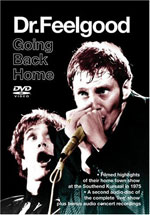Shop Around pt 7

Wilko played stark rhythm guitar, choppy, jagged, staccato. Very minimal weíd say nowadays. But it was his moves, his stage presence, that we need to celebrate. No one moved liked Wilko. Guitar as machine gun, gliding across the stage in a moonwalk Michael couldnít capture, staring out the audience, totally demented, but wonderfully entertaining.
The Feelgoods in the pre-punk wilderness of the mid-70s were part of a revolt which found solace in a return to the more basic thrills of source music like rockabilly, doo wop, ríníb, soul and garage punk. People like Ted Carroll who were central to fuelling this revisionist trend would in time become the story themselves. Carrollís Ace empire is a complete legend, and its contribution to music is immeasurable. Any roots pop fan should be aware the 2005 Ace catologue is out, celebrating a 30th anniversary, and itís an aesthetic delight as ever, if only for the Kent covers.
The latest release on Kent by the way is one of its most important. Itís Ady Croasdellís 6Ts: In The Beginning collection. Or, in other words, in the beginning there was rhythm Ďní soul. The CD celebrates the story of the 6Ts Rhythm Ďní Soul Society, a London institution. Started at the end of the Ď70s to feed the needs of Ď60s soul and ríníb disciples in the Capital, it too became the story, and is now rightly celebrated for its contribution to spreading the word about some of the best music ever made.
The music on the CD is peerless. But itís more than that. Itís like watching the Feelgoods DVD. Itís real history. The central characters here are so important, and pivotal in the musical education of so many people. Itís only been peripheral to me as a scene, but itís changed my life.
In 1979 when the 6Ts set got going at its Covent Garden venue, it brought together the hardcore rhythmínísoul sorts and the new generation of mods. Indeed the liner notes mention people from the Chords, Small Hours and the Maximum Speed fanzine being present at the first night. But for many among the new mod generation some of the organisers and DJs were opening a whole new musical vista which would have such impact.
From the 6Ts rhythmínísoul society would evolve Kent records, through the kind sponsorship of Ace. The earliest releases were very closely connected to the sounds spun at the societyís events, with Ian Clark providing graphics and Ady Croasdell writing sleevenotes as Harboro Horace, and gaining a huge cult following. Itís been said so many times before, but Kent did revolutionise the old soul world by creating compilations as aesthetically appealing as the rare 7Ēs they were assembled from. That was a complete reversal of roles, and itís easy to forget in an age where northern soul compilations are churned out. And the likes of the very great Lois Wilson are left to sort the gems from the gravel and keep us posted.
Indeed Kentís own close relative, BGP, curated by Dean Rudland, has just issued the mix CD, Andy Smithís Northern Soul. Slightly controversial as itís a mix rather than the straight cuts, but itís a smoother soul set than the 6Ts RhythmíníSoul one and full of absolute classics. But somehow it doesnít work for me. Is it that sense of history missing? Itís just that a DJ associated somehow with Portishead collecting tracks from a Northern Soul night now running at Camdenís Jazz Cafť does not set the imagination running in the same way as a man, who in the '70s has a Bronco Bullfrog poster on his wall, scouring the West End for suitable venues to put on a rhythmínísoul night for people who will be buried with a copy of a Big Maybelle 7Ē. And the CD package design doesnít work. Itís terrible.
I like the title in a funny kind of way though. Andy Smithís Northern Soul. It has a touch of Gordon Burn about it. Have you ever read his novels? They tend to surface in remainder bookshops, and are absolutely essential. They are very dark, but great on detail. Very, very good on the detail in fact, and theyíre full of faded folks, haunted by pasts and missed opportunities, preoccupied by how far theyíve fallen and the way the worldís changed and how hard it is to adapt. Theyíre funny and disturbing.
You can almost plot some kind of link between the books of Gordon Burn and the perversity of Dr Feelgood in 1975 in soiled suits savagely grinding out gritty ríníb in a way that still thrills, and then Brilleaux and Wilco parting company, and the sum of the parts never living up to the unholy whole while punk stole their thunder. But at least we have the video evidence of their magic when there was not a lot of it about.
© 2005 John Carney